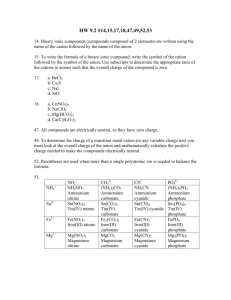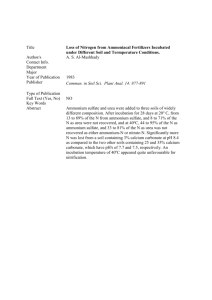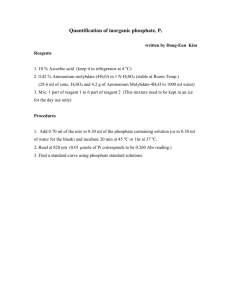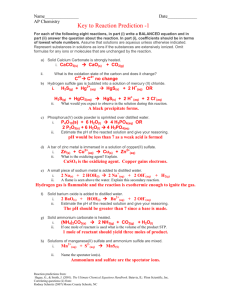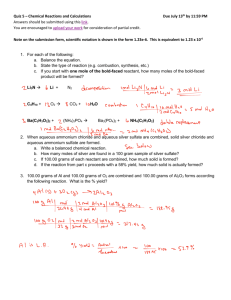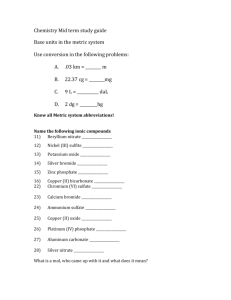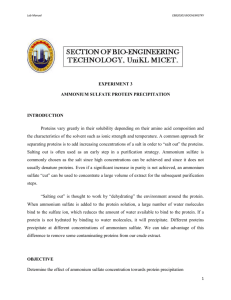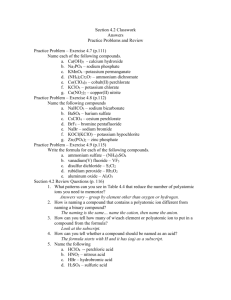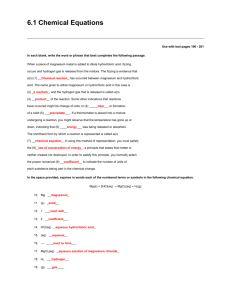Nutrient Content of Fertilizer Materials
advertisement
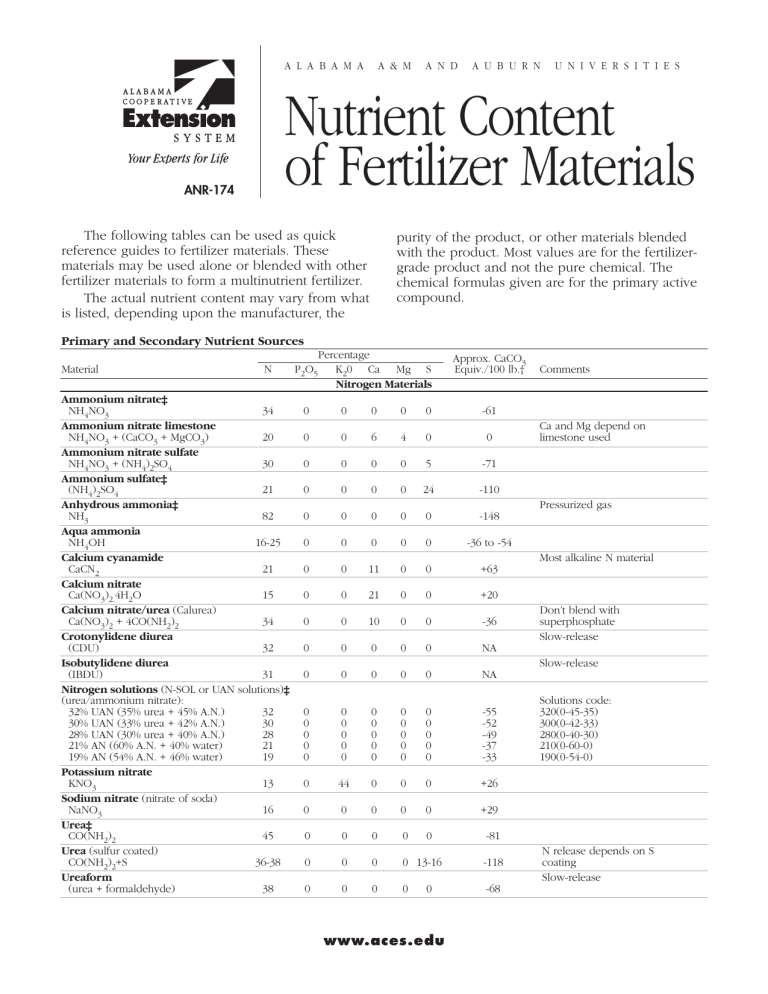
A labama A & M and A uburn U niversities Nutrient Content of Fertilizer Materials ANR-174 The following tables can be used as quick reference guides to fertilizer materials. These materials may be used alone or blended with other fertilizer materials to form a multinutrient fertilizer. The actual nutrient content may vary from what is listed, depending upon the manufacturer, the ­purity of the product, or other materials blended with the product. Most values are for the fertilizergrade product and not the pure chemical. The chemical formulas given are for the primary active compound. Primary and Secondary Nutrient Sources Material N P2O5 Percentage K20 Ca Mg S Nitrogen Materials Approx. CaCO3 Equiv./100 lb.† Comments Ammonium nitrate‡ NH4NO3 34 0 0 0 0 0 -61 Ammonium nitrate limestone Ca and Mg depend on NH4NO3 + (CaCO3 + MgCO3)20 0 0 6 4 0 0 limestone used Ammonium nitrate sulfate NH4NO3 + (NH4)2SO4 30 0 0 0 0 5 -71 Ammonium sulfate‡ (NH4)2SO421 0 0 0 024 -110 Anhydrous ammonia‡ Pressurized gas NH3 82 0 0 0 0 0 -148 Aqua ammonia NH4OH 16-25 0 0 0 0 0 -36 to -54 Calcium cyanamide Most alkaline N material CaCN221 0 0 11 0 0 +63 Calcium nitrate Ca(NO3)2.4H2O 15 0 021 0 0 +20 Calcium nitrate/urea (Calurea) Don’t blend with Ca(NO3)2 + 4CO(NH2)2 34 0 0 10 0 0 -36 superphosphate Crotonylidene diurea Slow-release (CDU) 32 0 0 0 0 0 NA Isobutylidene diurea Slow-release (IBDU) 31 0 0 0 0 0 NA Nitrogen solutions (N-SOL or UAN solutions)‡ (urea/ammonium nitrate): Solutions code: 32% UAN (35% urea + 45% A.N.) 32 0 0 0 0 0 -55 320(0-45-35) 30% UAN (33% urea + 42% A.N.) 30 0 0 0 0 0 -52 300(0-42-33) 28% UAN (30% urea + 40% A.N.)28 0 0 0 0 0 -49280(0-40-30) 21% AN (60% A.N. + 40% water)21 0 0 0 0 0 -37210(0-60-0) 19% AN (54% A.N. + 46% water) 19 0 0 0 0 0 -33 190(0-54-0) Potassium nitrate KNO3 13 0 44 0 0 0 +26 Sodium nitrate (nitrate of soda) NaNO3 16 0 0 0 0 0 +29 Urea‡ CO(NH2)2 45 0 0 0 0 0 -81 Urea (sulfur coated) N release depends on S CO(NH2)2+S 36-38 0 0 0 0 13-16 -118 coating Ureaform Slow-release (urea + formaldehyde) 38 0 0 0 0 0 -68 www.aces.edu Material N P2O5 Percentage K20 Ca Mg S Phosphorus Materials Approx. CaCO3 Equiv./100 lb.† Ammoniated superphosphate 12-1722-35 0 * 0 * -7 Ammonium phosphate‡ Diammonium phosphate (DAP) (NH4)2H2PO4 18 46 0 0 0 0 -70 Monoammonium phosphate (MAP) NH4HPO4 11 48 0 1 0 0 -65 Ammonium phosphate nitrate NH4H2PO4.NH4NO3 30 10 0 0 0 0 -54 Ammonium phosphate sulfate 4NH4H2PO4. x (NH4)2SO4 1620 0 0 0 15 -76 to -113 Ammonium polyphosphate‡ (NH4)HP2O7 + (NH4)5P3O10 10 34 0 0 0 0 — Basic Slag 0 0-6 * 3-29 * * +70 Bone meal (steamed) Ca3(PO4)2 + CaCO3 0-2 10-20 0 19-25 0 0 +20 Concentrated superphosphate‡ (triple superphosphate) Ca(H2PO4)2. x H2O 0 46 0 14 02 0 Nitric phosphate 12-1722-35 0 * 0 * -20 Normal superphosphate Ca(H2PO4)2. x H2O + CaSO4 020 021 0 11 0 Phosphate rock 02-35 0 * * 0 +10 Phosphoric acid‡ H3PO4 Wet-process acid 0 30 0 0 0 0 -63 Concentrated wet-process acid 0 40-54 0 0 0 0 -84 to -113 Superphosphoric acid 0 76 0 0 0 0 -110 Urea-ammonium phosphate25 35 0 0 0 0 Urea phosphate CO(NH2)2 + H3PO4 17 44 0 0 0 0 -82 Potassium Materials Greensand 0 1 6 0 0 0 Potassium carbonate K2CO3 solid 0 0 48 0 0 0 +70 K2CO3 liquid 0 0 34 0 0 0 +50 Potassium chloride‡ KCl(muriate of potash) 0 0 60 0 0 0 0 Potassium magnesium sulfate‡ (sulfate of potash magnesia) K2SO4.2MgSO4 or MgSO4.K2SO4.6H2O 0 021 0 1123 0 Potassium metaphosphate KPO3 0 59 39 0 0 0 * Potassium nitrate (nitrate of potash) KNO3 13 0 44 0 0 0 +26 Potassium sulfate (sulfate of potash) K2SO4 0 0 52 0 0 16 0 Calcium Materials Calcium chloride CaCl2 0 0 0 36 0 0 0 Burned lime CaO 0 0 0 70 0 0 +178 Calcitic limestone‡ (ground) CaCO3 0 0 0 36 0 0 +95 to 100 Dolomitic limestone‡ (ground) CaCO3 + MgCO3 0 0 024-30 6-12 0 +95 to 108 Selma chalk 0 0 0 32 0 0 +80 Gypsum‡ CaSO4.2H2O 0 0 022 0 18 0 Hydrated lime Ca(OH)2 0 0 0 50 0 0 +134 Alabama Cooperative Extension System Comments Mixture Liquid Analysis variable Total P2O5 relatively unavailable Liquid Research mixture Research Natural low-grade, mineral Most widely used, single fertilizer material Water soluble Solubility = 0.02 lb./gal. Solubility = 0.01 lb./gal. Material N P2O5 Percentage K2O Ca Mg S Magnesium Materials Approx. CaCO3 Equiv./100 lb.† Dolomitic limestone‡ (ground) CaCO3 + MgCO3 0 0 024-30 6-12 0 +95 to +108 Magnesium ammonium phosphate MgNH4PO4.6H2O 8 40 0 0 15 0 Magnesium oxide MgO 0 0 0 0 45 0 +250 Magnesium sulfate‡ (Epsom salt) MgSO4.7H2O 0 0 0 0 10 13 0 Magnesium sulfate (Kieserite) MgSO4.H2O 0 0 0 0 1723 0 Potassium magnesium sulfate‡ (sulfate of potash magnesia) K2SO4.2MgSO4 0 021 0 1123 0 Sulfur Materials Ammonium sulfate‡ (NH4)2SO421 0 0 0 024 -110 Ammonium thiosulfate‡ (60% solution) (NH4)2S2O3 12 0 0 0 026 Elemental sulfur (S): Wettable S 0 0 0 0 0 90-100 -312 Flowable S 0 0 0 0 0 52-70 -218 Flowers of S 0 0 0 0 0 90-100 -312 Gypsum‡ CaSO4.2H2O 0 0 022 0 18 0 Magnesium sulfate (Epsom salt) MgSO4.7H2O 0 0 0 0 10 13 0 Potassium magnesium sulfate‡ 0 021 0 1123 0 Potassium sulfate K2SO4 0 0 52 0 0 16 0 Sulfuric acid H2SO4 0 0 0 0 020-26 -62 to -81 Comments Analysis variable; must contain at least 6% Mg Solubility = 0.001 lb./gal. Solubility = 0.00062 g/100 g 0.001 oz./gal. Solubility = 7.6 lb./gal. Solubility = 5.7 lb./gal. Soluble Available in prilled or water-soluble crystals Liquid; reacts with alkaline materials Elemental S must be oxidized to sulfate before available to plants Soluble Soluble Liquid; highly reactive †Negative value indicates net acidifying effect on soil; positive value indicates net basic reaction in soil. ‡Commonly available materials *Present in undetermined amounts Symbol key: N = Nitrogen; P2O5 = Phosphate; K2O = Potash; Ca = Calcium; Mg = Magnesium; S = Sulfur; CaCO3 = Calcitic Limestone Micronutrient Materials Materials Nutrient Content Copper (Cu) Chelated Cu*: Cu EDTA 13% Cu Cu HEDTA 9% Cu Cupric ammonium phosphate Cu(NH4)PO4.H2O 30% Cu Cupric oxide (CuO) 60-80% Cu Copper sulfate*: CuSO4.H2O 35% Cu CuSO4.5H2O25% Cu CuSO4.3Cu(OH)2 13-53% Cu Copper frits 40-50% Cu Copper polyflavonoid 6% Cu Boron (B) Borax (sodium tetraborate decahydrate) Na2B4O7.10H2O 11% B Boric acid (H3BO3) 17% B Boron frit/sodium borosilicate 6% B Calcium borate (colemanite) Ca2B6O115H2O 10% B Fertilizer borate* (sodium tetraborate) Borate Granular (Na2B4O7.5H2O) 14% B Borate 48 15% B 48 refers to percentage B2O3 Materials Nutrient Content Boron (B) Solubor*20% B Na2B4O7 66% B2O3 Magnesium borate (boracite) 2Mg3B8O15.MgCl221% B Iron (Fe) Basic slag 10-13% Fe Ferric sulfate Fe2(SO4)3.4H2O20% Fe Ferrous sulfate* FeSO4.7H2O20% Fe Ferrous ammonium sulfate (NH4)2SO4.FeSO4.6H2O 14% Fe Ferrous ammonium phosphate29% Fe Fe(NH4)PO4.H2O Ferrous oxalate FeC2O4.2H2O 30% Fe Ferrous carbonate FeCO3.H2O 42% Fe Iron chelates*: Fe DTPA 10% Fe Fe EDTA 9-12% Fe Fe EDDHA 6% Fe Fe HEDTA 5-9% Fe Iron ligninsulfonate 5-11% Fe Iron polyflavonoid 6-10% Fe Iron Frits 40% Fe Nutrient Content of Fertilizer Materials Materials Nutrient Content Materials Basic slag 1-3% Mn Manganese frits 10-25% Mn Manganese chloride MnCl2 17% Mn Manganese carbonate MnCO3 31% Mn Manganese oxide MnO 68-70% Mn Manganese sulfate* MnSO4.4H2O24% Mn Manganese chelate* Mn EDTA 12% Mn Manganese ammonium phosphate28% Mn Mn(NH4)PO4.H2O Manganese polyflavonoid 8% Mn Molybdenum (Mo) Ammonium molybdate (NH4)6Mo7O24.2H2O up to 54% Mo Nutrient Content Molybdenum (Mo) Manganese (Mn) Sodium molybdate* Na2MoO4.2H2O Molybdenum frit Superphosphate 38-46% Mo 30% Mo trace as impurity Zinc (Zn) Zinc chelate* Na2Zn EDTA 9-14% Zn Zinc ammonium phosphate 34% Zn Zn(NH4)PO4.H2O Zinc sulfate* ZnSO4.H2O22-36% Nn Zinc sulfide (sphalerite) 61% Zn Zinc oxide ZnO 78-80% Zn Zinc ligninsulfonate 5-12% Zn Zinc polyflavonoid 7-10% Zn *Commonly used materials Organic Fertilizer Materials (Approximate Values) Acidic (-) MicroNeutral (0) Material N P2O5 K2O Ca Mg S nutrients Alkaline (+) Blood (dried) 12-15 3 1 * * * * Blood meal 15 1 1 * * * * Bone meal (steamed) 0-2 10-20 0 19-25 0 0 + Compost (garden) Variable depending upon components and amendments Cottonseed meal 6-72.5 1.5 * * * * Cottonseed hull ash 027 * * + Cotton motes2 0.5 3 4 0.7 0.6 * (composted gin wastes) Fish scrap 7-10 1-2 0 * *2 (acidulated) Fish scrap (dried 9 3 6 * * * fish meal) Hay: Legume 3.0 1.02.4 1.2 0.2 0.3 * Grass 1.5 0.5 1.9 0.8 0.2 0.2 * Manure: (dried) Cattle 1.5 1.5 1.2 1.1 0.3 * * Horse 0.4 0.2 0.3 * * * * Poultry Broiler litter 3.0 3.02.0 1.8 0.4 0.3 * + Hen-caged layers 1.5 1.3 0.5 6 0.4 0.3 * + Hen-litter 1.82.8 1.4 * * * * + Sheep 0.6 0.3 0.2 * * * * Swine 0.6 0.4 0.1 * * * * Peat/Muck2.3 0.5 0.7 * * Sawdust (mixed soft 0.2 0 0.2 + hardwoods) Seaweed (dried) 0.7 0.8 5.0 * * * * +, Sewage sludge 5 6 0.5 3 1 1 + (dried, municipal) Tankage 7 1.5 3-10 * * * * -, + Wood ashes 02 620 1 * + *Present in undetermined amounts Comments May contain weed seed Traces of I and Hg Feedlot manure usually contains 60-70% water Average moisture (houses) = 20% Average moisture = 70% Average moisture = 37% High C:N ratio; needs N fert. Depending upon source, may contain heavy metals. Use only on nonfood-producing areas. 70% CaCO3 equivalent Symbol key: N = Nitrogen; P2O5 = Phosphorus; K2O = Potassium; Ca = Calcium; Mg = Magnesium; S = Sulfur Charles C. Mitchell, Extension Agronomist, Professor, Agronomy and Soils, Auburn University For more information, call your county Extension office. Look in your telephone directory under your county’s name to find the number. ANR-174 Issued in furtherance of Cooperative Extension work in agriculture and home economics, Acts of May 8 and June 30, 1914, and other related acts, in cooperation with the U.S. Department of Agriculture. The Alabama Cooperative Extension System (Alabama A&M University and Auburn University) offers educational programs, materials, and equal opportunity employment to all people without regard to race, color, national origin, religion, sex, age, veteran status, or disability. 6M, Reprinted March 2008, ANR-174 © 2008 by the Alabama Cooperative Extension System.
